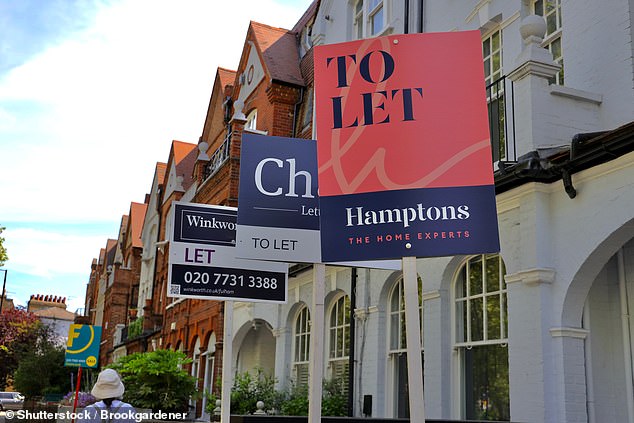Stress of renting ages you TWICE as quick as being unemployed, claim scientists
- The researchers used housing and DNA methylation data from 1,420 people
- However, according to scientists, residents of public housing seemed to be doing better
Whether it’s recent mortgage increases or a leaky roof, owning a home isn’t without stress.
However, research suggests that living in rental apartments ages us the most.
According to a study, renting in the private sector leads to faster biological aging than owning a home or living in public housing.
Experts said the impact of private rentals on aging is almost double that of unemployment compared to paid employment.
The good news is that the process is reversible, suggesting that those who climb the property ladder can repair any damage.

Research suggests that living in rental apartments ages us the most. According to a study, renting in the private sector leads to faster biological aging than owning a home or living in public housing. Experts said the impact of private rentals on aging is almost double that of unemployment compared to paid employment
Biological aging is understood as the deterioration in the functioning of body tissues and cells, regardless of the actual age of a person, the acceleration of which was previously associated with stressful life events.
Researchers from the University of Essex and the University of Adelaide in Australia used data on housing and DNA methylation – a chemical marker of DNA changes – from the UK Household Longitudinal Study, linked to previous survey responses from the British Household Panel Survey (BHPS).
The analysis took into account factors such as rental length, building type, government financial support for tenants, presence of central heating, housing costs, arrears, overcrowding and expectations of moving.
Additional health information was collected from the 1,420 people in the BHPS survey and blood samples were taken for DNA methylation analysis.
They found that renting privately, repeatedly defaulting on rent, or living in a pollution-affected home were associated with faster biological aging.
However, public housing residents appeared to fare better, in part because of safety and lower costs.
The researchers wrote in the Journal of Epidemiology and Community Health that they showed that living situations “can get under the skin and have significant health consequences.”
They wrote: “We find that living in a privately rented apartment is associated with faster biological aging.”
“Importantly, the impact of private renting is greater than the impact of unemployment or having previously smoked or never smoked.”
“When we include historical housing circumstances in the analysis, we find that repeated housing deterioration and exposure to pollution/environmental problems are also associated with faster biological aging.
“Our results suggest that difficult living conditions have a negative impact on health through faster biological aging.”
“However, biological aging is reversible, highlighting the significant potential of changes in housing policy to improve health.”
Limitations of the study include that there were no current measures of housing quality and the DNA methylation data only came from white European respondents.
Nevertheless, they conclude that measures to reduce the stress and uncertainty associated with private renting, such as ending no-fault evictions, limiting rent increases and improving conditions – some of which have already happened in the UK – need to be taken Cuts can lead to the negative impact of private rentals.
